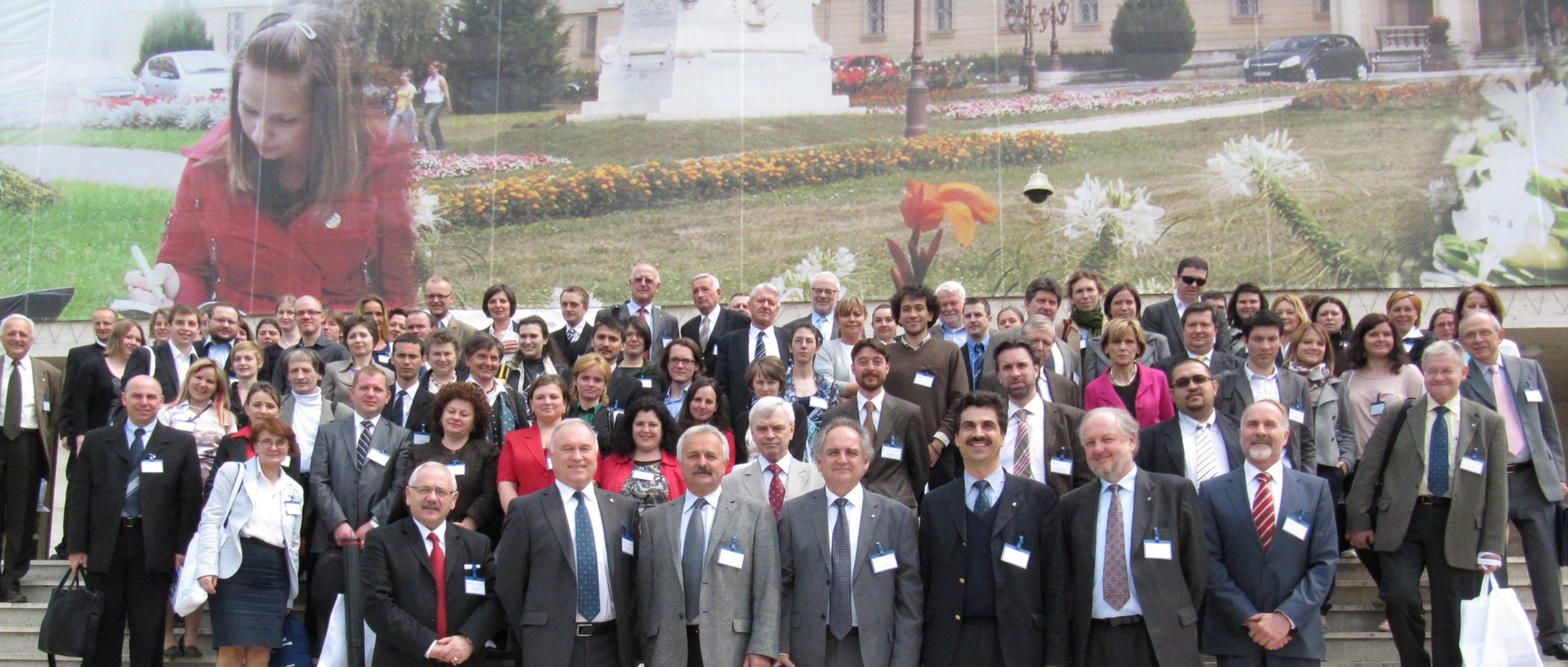The CASEE Board and the St. Istvan University Gödöllö, Hungary were pleased to welcome more than 100 participants at the
CASEE Conference 2011:
"The EU Strategy for the Danube Region - with Specific Emphasis on Land and Water Management and the Environment"
April 28th - 29th, 2011, St. Istvan University Gödöllö, Hungary
The river Danube - seen not as a dividing line but a connection of different peoples and ideas - formed the key element of the 2nd conference of the CASEE network of universities. The conference combined a significant scientific programme and a strategic discussion: In the framework of the EU strategy of the Danube region the CASEE network now has the opportunity to participate in the process of implementation and to take a certain lead in respect to involved research and educational topics.
The Conference was opened by Rector Solti (Szent István University, Gödöllö) and the CASEE President Rector Gerzabek (BOKU, Vienna). The keynotes of the first session gave a profound strategic (Dr. Busek) and scientific (Prof. Somlyódy and Prof. Waidbacher) introduction. After two presentations on running educational projects in the CASEE countries, the potentials of the network in research cooperation were presented. In workshops on "Water" and "Biodiversity and Natural Resources" the representatives of the universities - including also many young scientists - deepened the discusson and developed new project ideas.
Agenda
Presentations
Keynote speeches
Keynote presentation on the EU strategy for the Danube region
(by Dr. Erhard Busek, former Austrian minister of science and president of the Institute for the Danube and Central Europe, consultant to EU Commissioner Hahn).
Keynote presentation on “Future Waters in the Danube Basin: Problems and Opportunities"
(by Prof. László Somlyódy, member of the Hungarian Academy of Sciences, from the Budapest University of Technology and Economics)
Presentation on the Ecological situation of the Danube Region and its relevance for Life Sciences
(by Prof. Herwig Waidbacher, BOKU)
Presentations on running/suggested educational and other projects in the CASEE countries
1. Academia Danubiana: Spatial Planning and the learning region concept
(Prof. em. Werner Kvarda, BOKU)
Projects: ELLS-SAT, IPSOIL (DI Dora Kertesz, BOKU)
2. The Role of Expert Teachers in Education - Quality Improvement at the Faculty of Agriculture
(Ing. Ivona Filipovic, University of Zagreb)
3. Potentials of CASEE universities for the common research projects and papers
(Vice-Rector Michal Lostak, Prof. Lukas Zagata, Czech University of Life Sciences, Prague)
Thematic Workshops
Water
Chair: Prof. Pavel Kovar, Czech University of Life Sciences, Prague
Co-Chair: Prof. Kazimierz Banasik, Vice Rector, Warsaw University of Life Sciences
Presentations:
1. How to Mitigate Harmful Impact of Floods - Case Study of Flood Impact Mitigation
on the Nemcicky Catchment, Czech Republic
(Pavel Kovar, Darina Vassova; Czech University of Life Sciences, Prague)
2. Water Protecting Actions in the Danube Region Strategy - Expectations and Facts
(László Perger; Central Directorate for Water and Environment)
3. Danube Region Strategy - Managing Environmental Risks
(Péter Bakonyi; Vituki Environmental Protection and Water Management Research Institute Ltd.)
4. A New Linkage Approach to the River Economic Complex Development
(Daniel Yordanov Pavlov; University of Ruse “Angel Kunchev”, Bulgaria)
5. Climate or Land Use Change – Identification of Future Main Factors Influencing Water Management. Narew River Basin Case Study
(Mikolaj Piniewski, Tomasz Okruszko, Marek Gielczewski, Mateusz Stelmaszczyk; Warsaw University of Life Sciences)
6. Possibilities of Flood Forecasting in the Small Headwater Catchments: Case Study in the Czech Republic
(Petr Máca, Jana Redinová, Jirka Pavlaásek, Vojtech Havlicek, Pavel Pech; Czech University of Life Sciences, Prague)
7. Trace Metals in Agricultural Soils of the Danube River Tributary Basins in Croatia,
(Helena Bakic, Marija Romic; University of Zagreb)
Biodiversity and Natural Resources
Chair: Prof. Doru Pamfil, Rector of USAMV Cluj Napoca
Co-Chair. Prof. Milan Mesic, Vice-Dean of FAZ University of Zagreb
1. Reintroducing Native Broadleaves to Mountain Coniferous Stands Under Harsh Environmental Conditions
(Ivan Kuneš, Martin Baláši, Pavel Burda, Katerina Millerová; Czech University of Life Sciences, Prague)
2. Effect of Water Dependent Ecosystem Restoration in Strongly Urbanized Landscape
(Daria Sikorska, Piotr Sikorski; Warsaw University of Life Sciences)
3. Vegetation Structure of Oxbow Lakes along Urban-Rural Gradient – Case study of Warsaw, Poland
(Piotr Hewelke, Daria Sikorska, Piotr Sikorski, J.Chwedoruk; Warsaw University of Life Sciences)
4. Rural Development in Istria – PRIMA Project Based Preliminary
(Mario Njavro, Ramona Franic, Tihana Ljubaj, Marija Romic; University of Zagreb)
5. Scientific Base for Determination of Nitrate Vulnerable Zones in Croatia
(Milan Mesić, Davor Romić, Stjepan Husnjak, Zdenko Lončarić, Milan Poljak; University of Zagreb)
6. Challenges and Opportunities the Agricultural Insurance Industry is Facing in Relation to Climate Change
(Anna Lorant, Maria Fekete; St Istvan University, Gödöllö)
For the Workshops of the General Assembly please have a look on the moodle platform.
Contact person for organsational questions:
Dr. Tarr Zsuzsanna / Zsuzsanna Tarr, PhD
Külkapcsolati Irodavezető / Head of External Relations Office
LLP Erasmus Intézményi koordinátor / LLP Erasmus Institutional Coordinator
Szent István Egyetem / Szent István University
2100 Gödöllő, Páter Károly u. 1.
Tel: +36-28-522000/1017
Fax: +36-28-410-804
E-mail:


